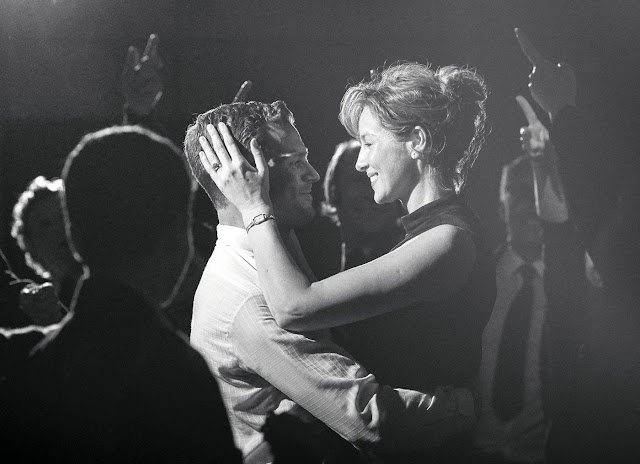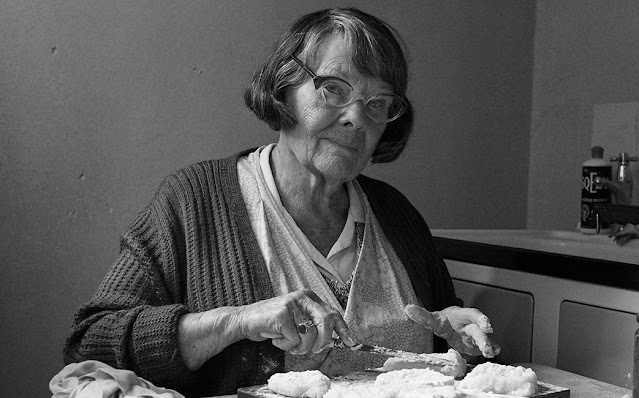 |
| Jamie Dornan and Caitriona Balfe in Belfast. |
Watching the black-and-white trailers for Belfast, Kenneth Branagh’s fictionalized memoir of growing up Protestant in the titular city at the peak of the Irish Troubles (the film begins in the summer of 1969), I feared that he’d been caught in the trap of turning his childhood into self-conscious neo-realism, like Alfonso Cuarón in the strenuously overrated Roma. I needn’t have worried. Haris Zambarloukos’s cinematography opens in almost hallucinatory color that reveals Belfast in all its complexity, modernist and glittering as well as enshrining gorgeous old buildings. And when the color morphs into black and white, it’s the bustling, lived-in black and white of the Parma Bertolucci and his photographer, Aldo Scavarda, captured in his the 1964 Before the Revolution or, as a friend observed, the black and white of the pictures Tony Richardson made in the late fifties and early sixties out of the great English New Wave dramas Look Back in Anger and The Entertainer (both shot by Oswald Morris) and A Taste of Honey (shot by Walter Lassaly). Belfast isn’t quite up to those movies – or the other movies I thought of while I sat through it, John Boorman’s 1987 Hope and Glory (based on his memories of a childhood in London during the Second World War) and Jim Sheridan’s 2002 In America (a too-little-known magic-realist marvel about a struggling Irish family living illegally in Hell’s Kitchen). But Belfast is plenty good enough. It’s vibrant and vivifying, and I was carried away by it.
The inspiriting surprise of Hope and Glory was that it was a comedy. It looked at the Blitz through the wide-open eyes of an eight-year-old boy who has the time of his life tracking through the rubble and thinks the melodrama and pieties of the adults are sappy and silly. The kid’s healthy sense of fun and his insistence that the adult world is ridiculous turns the sanctification of the courage and endurance of the Brits, memorialized in solemn pictures like In Which We Serve and the fraudulent, Oscar-winning Mrs. Miniver, on its head. Branagh doesn’t quite do that in Belfast, where the protagonist, Buddy (Jude Hill, an expressive little boy whose face is prodigiously wrinkled with worry), is about the same age as Boorman’s. When Protestant activists led by thuggish Billy Clanton (Colin Morgan), who went to school with Buddy’s father, Pa (Jamie Dornan), stage violence in the streets and threaten not only the few Catholic families in the neighborhood but any other Protestants who aren’t willing to join in the fight, like Pa himself, the danger is real, and frightening. But Branagh, who also wrote the witty, literate screenplay, pulls off a very tricky mixed tone throughout the film. When Clanton’s flame throwers wreak havoc, Buddy’s mother, Ma (Caitríona Balfe) rushes out of the house and rescues him from peril, throwing a garbage can lid over their heads to protect them from the conflagration. Later, Buddy’s insistent, intimidating teenage cousin Vanessa (Nessa Eriksson) involves him in a shoplifting caper at a local sweets shop that’s a disaster all around: all they manage to make off with is Turkish delight, which they both detest, and the shopkeeper can see exactly who’s trying to rob him. So Buddy’s mother gets a visit from the local cops.
The movie is suffused with comic grace notes, like the toilet that sits in an open cubicle at the edge of Buddy’s grandfolks’ yard, which he uses as a chair when he’s keeping his grandfather (Ciarán Hinds), known as Pop, company while Granny (Judi Dench) contributes to the conversation from her kitchen window. Or the policy of Buddy’s wry schoolteacher (Vanessa Ifediora) to reward students who excel on math assignments by moving them to the front of the classroom, while their mates toil at what she deems a “Sisyphean struggle” to keep up. Branagh burlesques the sermon from Portrait of an Artist as a Young Man, with a Protestant minister (Turlough Convery) who concludes his threats of hellfire and damnation with the ejaculation, “Now, money!” as he circulates the donation plate without altering his tone. Here too Branagh is entertaining more serious issues at the same time: the link to one of the most famous passages in Joyce underscores the superficiality of the distinctions between Protestant and Catholics. Buddy and Cousin Vanessa have a serious conversation (which is also quite funny) about how confusing it is not to be able to tell whether you’re talking to a Catholic or a Protestant and thus what it is permissible to say; even a family name can be misleading. It turns out that Buddy’s first crush, an adorable classmate with blonde tresses, Catherine (Olive Tennant), is Catholic. Pa, like many of his neighbors, resents the increasingly obtrusive efforts of Billy Clanton and his boys to drive out the Catholics and helps to erect a barbed-wire barricade in an effort to keep them away. He gets along easily with everyone except Billy, whose activism is an excuse for the bullying Pa has observed from him since they were kids; he isn’t afraid to tell Billy to his face that he’s nothing but a “jumped-up little gangster.”
 |
| Judi Dench in Belfast. |
Romance enhances the movie’s tone, too. Ma and Pa dance in the street to a portable record player. Entertaining his grandson’s queries about how to court Catherine, Pop breaks into Lerner and Loewe’s “How to Handle a Woman” - the film of Camelot would have made the rounds of the Belfast moviehouses a year or two earlier, and this is an enthusiastic moviegoing family – and then sweeps Granny up into a waltz in the kitchen. (This is a wonderful moment.) Buddy watches, rapt, while Catherine gets her long hair brushed at the window – a charming image. She’s one of the smartest children in their class; he’s eager to shine on the weekly math homework so he can sit near her. Pop advises him to draw his ones and his sevens so they’re indistinguishable and his teacher will give him the benefit of the doubt – and it works. But the course of true love runs smoother for Buddy than it does for his parents. Pa is a joiner who landed a job in London when they were tough to come by in Belfast, and though Ma understands the economic necessity of his choice, at the same time she resents him for seeing so little of Buddy and his older brother Will (Lewis McAskie) and leaving her to raise them largely by herself. He acknowledges her complaint and credits her with taking the lion’s share of the job of parenting. As the violence escalates at home he plans an “escape route” – maybe Sydney, maybe Vancouver. Eventually he’s offered a more promising job in London, though Ma is loath to leave her family and friends and the city she grew up in. Pa warns her that it’s not just her safety and their children’s that worries him but the possibility that their marriage won’t survive their living apart for much longer. Dornan, who looks like an older version of one of the Hickman brothers from the old TV sitcom The Many Loves of Dobie Gillis crossed with a young Dennis Quaid, is sensitive and affecting as Pa, and as Ma, Balfe (she played Christian Bale’s feisty wife in Ford v Ferrari) offers one of the year’s standout leading performances.
Buddy is very close to his paternal grandparents. When he’s presented with the possibility of emigrating, the first thing he demands to know is whether Granny and Pop will come along. But if there was ever a chance of it, it vanishes when Pop is hospitalized with lung cancer. Hinds and Dench are an inspired match as an aging couple who have clearly been the great, untarnished love of each other’s lives. Early on in his decline, when Pop has to go to the hospital for tests, he wants to make the trip by himself; brooking no argument, she declares that she will be accompanying him, waiting for him and bringing him back home. In this scene Dench lines Granny’s unbending firmness with an unstated loving force, and her grief when he dies – also conveyed wordlessly – is heartrending. Dench inhabits Granny’s plainness (her hair looks like it was cut with a bowl, and bangs hang over her brow) and her unfussiness. She’s a magical presence here. I’ve been in thrall to this actress since I saw her play Beatrice in Much Ado About Nothing when I was in my twenties; after nearly half a century I can still hear some of her line readings in my head. And I suspect I won’t forget the way she tells Buddy about seeing Lost Horizon three decades earlier: when he asks if she dreamed of visiting the movie’s mystical city in the Himalayas, she answers, “There were no roads to Shangri-La from our part of Belfast.” Nor am I likely to forget the way Hinds’s Pop, who knows he’s dying, promises Buddy as the family makes plans to leave Ireland, “You’ll always know where to find me.”
The heady mix of violence and comedy established at the outset of Belfast reaches its climax in a complicated sequence late in the movie. Cousin Vanessa is seduced by the illicit nature of the demonstrations: when the protesters loot another local store, she drags her little cousin into it and strong-arms him into making away with something. But the first thing he grabs is stain remover, and then his scandalized mother makes them both return it. “We don’t put things back,” Clanton insists. “That’s not the statement we’re trying to make.” The line is hilarious, but Clanton doesn’t recognize how ridiculous he sounds; he’s deadly serious. Literally so: he and Pa finally tangle in this scene when he threatens Buddy’s life, in a face-off that is Branagh’s most deftly accomplished work in the film.
Wisely, Branagh gives Dench the last moments of the movie, when she sees off the emigrants, who are boarding a bus, from a distance. Surely it’s as great a scene as she can ever have played.
 – Steve Vineberg
is Distinguished Professor of the Arts and Humanities at College of the
Holy Cross in Worcester, Massachusetts, where he teaches theatre and
film. He also writes for The Threepenny Review and is the author of
three books: Method Actors: Three Generations of an American Acting Style; No Surprises, Please: Movies in the Reagan Decade; and High Comedy in American Movies.
– Steve Vineberg
is Distinguished Professor of the Arts and Humanities at College of the
Holy Cross in Worcester, Massachusetts, where he teaches theatre and
film. He also writes for The Threepenny Review and is the author of
three books: Method Actors: Three Generations of an American Acting Style; No Surprises, Please: Movies in the Reagan Decade; and High Comedy in American Movies.
No comments:
Post a Comment